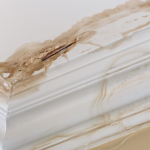The Damages of Pipes Bursting
Each year many homes become damaged from bursting pipes resulting in thousands of dollars in damages. If caught in a timely manner, the damages done could be minimal, however more often than not, the damage could leave you with extensive repairs and sizable replacement costs, like new drywall, flooring, plumbing or electrical work, and potentially mold and mildew removal.
Why Do Pipes Burst?
There are many things that lead to a leaky or burst pipe, but there are four major causes of damage:
Extremely Low Temperatures – Extremely cold temperatures can cause the water in your pipes to freeze, thus expanding and increasing pressure inside the pipe causing it to burst. Most often, this happens to pipes that are not buried deep enough, placed in exterior walls, or that are not exposed to warmer air in your home.
Corrosion – Pipes are built to last a long time, giving you years of dependable service. But they are unfortunately not made to last forever. Years and years of use can lead to build up that can cause a pipe to leak or burst. Corrosion is often caused by a pH imbalance in your water. This starts out as a small issue, but time takes its toll on your pipes causing damage that narrows the pipe’s diameter, making it difficult for water to flow.
Water Pressure Problems – Maintaining normal water pressure is very important for the health of your pipes. If your pipes experience a sudden and significant increase in pressure, a pipe can burst or a faucet or toilet can fail.
Water Hammer – Pipes that are not properly secured in your walls or floors can clank and bang around (this is called “water hammer”). Over time, this can weaken the joints allowing water to escape.
What Can Be Done About It?
Prevention is your best defense. As the weather changes (even within the season), it is important to take a look at the interior and exterior of your home for any signs of leakage. Any pipes in shed or garages should be buried deep enough. Cover any exposed pipes with insulation and remove garden hoses from faucets. If you’re able, leave hot and cold faucets open just enough to allow a drip, insulate your cold water tank, and try not to turn your thermostat down too much at night. For rooms in your home that are not well heated, leave the door open or the cupboard door open (to expose the sink pipes) to allow for warmer airflow. Have any known damages repaired immediately and check your water pressure often. If you are unsure your home’s pipes are in good condition or how to handle preventing any damage, consider a professional’s opinion.
Though, prevention is not a sure safeguard. So, your next best line of defense is to be prepared. When accidents like this arise it is best to have Hudson Douglas on your side. With more than 50 years of experience in construction and disaster restoration, Hudson Douglas understand the need to have professional representation in order to quickly and fairly settle their insurance claims. Contact us today to learn more.




